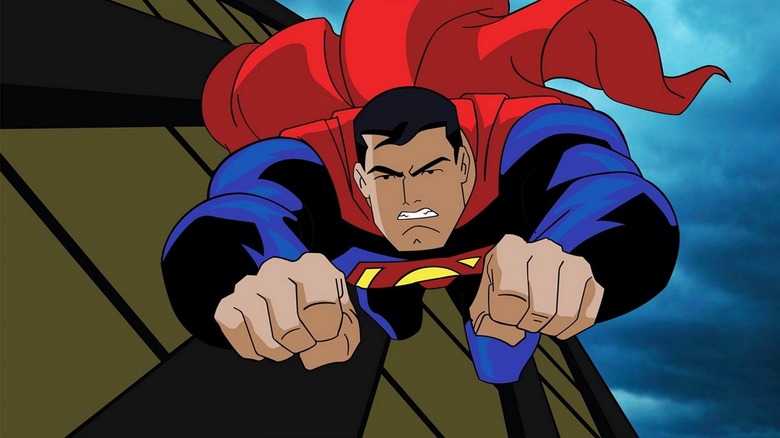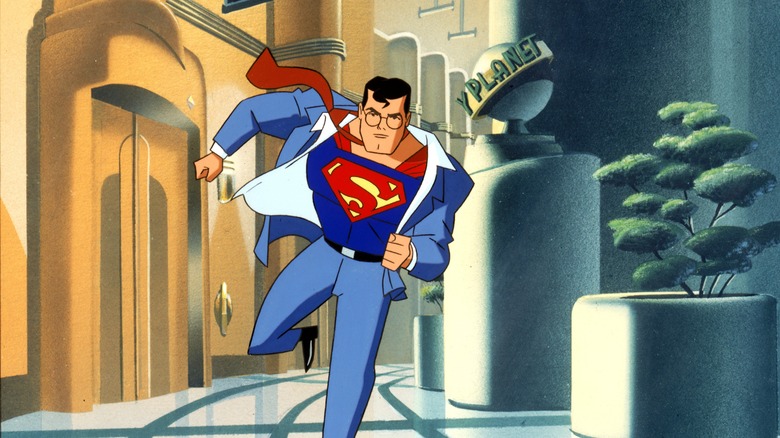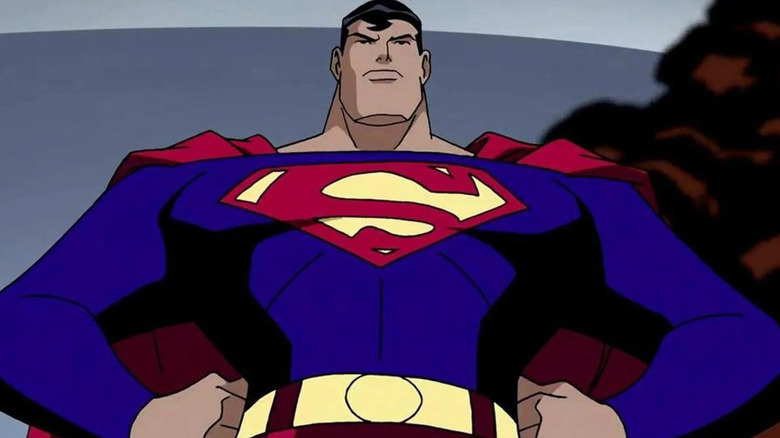Tim Daly Didn't Understand The Significance Of Starring In Superman: The Animated Series
The troubled production of Tim Burton's unproduced feature film "Superman Lives" may be common knowledge by now. The story briefly, for those unfamiliar: following the success of Burton's "Batman" and "Batman Returns," Warner Bros. was to work with the director on a new Superman feature film, the first since the disappointing "Superman IV: The Quest for Peace" in 1987. Many stories have circulated about that film's labored development, most of which can be summed up either by filmmaker Kevin Smith (who was hired to write a draft after his 1995 film "Mallrats"), or in Jon Schnepp's 2015 documentary film "The Death of 'Superman Lives': What Happened?" The film ultimately fell through, and another Superman feature film wouldn't be made until 2006.
While filmmakers were stumbling over their feet, trying to make whatever version of Superman they could, the plucky Kryptonian was quietly enjoying massive success on the small screen. In 1996, Alan Burnett and Bruce Timm — also coming off of the success of their own version of Batman — developed "Superman: The Animated Series." Employing Timm's same square-jawed, Art Deco aesthetic he employed for "Batman: The Animated Series," the new Superman show was bold and bright, featuring writing that was just as nuanced and sophisticated as its forebearer. The show ran for four seasons, a long time for kid-friendly cartoon shows, ending its run in 2000. It won two Emmys in 1998 and 1999.
Actor Timy Daly played the voice of Clark Kent. At the time, Daly was also appearing regularly on the hit sitcom "Wings," which, he felt, was the more important work. Indeed, in a 2021 interview with Flickering Myth, Daly admitted that playing Superman was a mere lark for him, and he didn't appreciate how important the character actually was.
'My shame'
Speaking with interviewer Ricky Church, Daly was openly apologetic. In the mid-1990s, one might be forgiven for dismissing Superman as a character. DC Comics' "Death of Superman" incident was already a few years old, and the last movie was almost a decade ago. Kal-El was most certainly out of the public eye, a dated character who was out of place in a snarky, cynical decade. Additionally, cartoon voice acting was — and often still is — considered low on an unspoken social hierarchy of acting. Some people in their 40s will recall when film actors refused to move to TV, for instance. In Roger Ebert's 2001 review of "Monsters, Inc.," he said that voice acting was what actors once did instead of dinner theater.
Daly took the Superman job merely because it was a job, and not because Superman meant anything. He said:
"You know, I have admitted in many interviews and I will admit to you in my shame that I didn't understand it at the time. I thought that I was sort of doing a Saturday morning cartoon show for kids. I didn't realize how important Superman was to generations of people, children, adults, men and women and it wasn't until later that it occurred to me how important this character was to people and how important it had been for so many decades. So I was a little slow on the uptake, but I get it now!"
Daly doesn't mention the moment, and there must have been one, where he realized he was part of a larger pop phenomenon. He did, however, have some positive things to say about the character, understanding the central detail of Superman's lasting appeal.
'He's just good'
Anecdotally, this author has heard some say that Superman, in being nigh indestructible, can't be interesting as a character. Some seem to feel that a superhero ought to be constantly struggling to be appealing. Daly doesn't see it that way. Having played the character for years, he feels that Superman's utter lack of angst or inner conflict is the whole point. He recounted:
"Well, I think that the thing that I appreciate about Superman even more now than when I was first voicing the show was that he's just good. He doesn't have a grudge. He's not vengeful, he's not settling any scores. He's just trying to help the human race be better and live in a more peaceful way. Even though he has definitely some childhood trauma, he lost his parents and his planet, he is not embittered the way Batman can seem to be, you know, he's not dark."
Indeed, Superman may best be seen as an aspirational figure. For people who are frustrated by the injustices they may witness in the real world, Superman offers a self-insert fantasy figure that allows readers/viewers to inject themselves into a superpowered body. Superman knows how to fix major crises, and has the power to do it. He doesn't defeat his enemies by punching them to death. He stops them. It's important that Superman be more powerful than his enemies. He is bright and fun.
At least he was in "Superman: The Animated Series," the best piece of Superman on either side of it by a decade.


